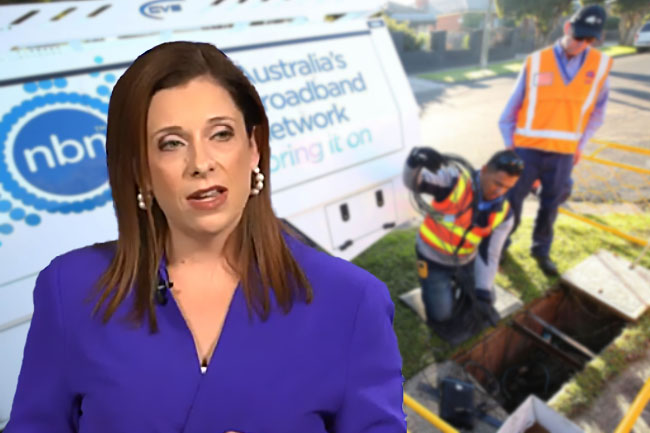Taxpayers will now have to throw good money after bad with the Turnbull Government's proposed 'broadband tax', in an attempt to fix the bottomless pit crisis the NBN is now resembling, writes Paul Budde.
FROM THE MOMENT this suggestion was first mooted, I was strongly opposed to the broadband tax the Government proposed in December 2016.
It will slam around $7 per month on fixed broadband subscriptions, making the price of broadband services in Australia among the highest in the developed economies.
The aim of the tax is to provide a cross-subsidy scheme for the fixed wireless broadband network that the government is rolling out in regional and rural Australia through its national broadband network company.
When former Prime Minister Tony Abbott and his then Communications Minister Malcolm Turnbull (both at that time in Opposition) announced their plans to kill off the National Broadband Network (NBN) (this was later replaced with a policy to roll out a so-called cheap and fast multi-technology mix (MTM) solution), I indicated that this change from the original future-proofed fibre-to-the-home (FTTH) network would be fraught with problems. Those predictions have since been proved to be absolutely correct.
Hmmm I wonder if this is what @TurnbullMalcolm meant when he said #multitechnologymix #nbnfail #fttn #fttb #skymuster #hfc #fttp pic.twitter.com/yOc0IVCPfV
— Andrew Robinson (@sundancewfs) May 5, 2017
The "cheap and fast" solution would cost $25 billion and was to be finished by 2016. We all know that the project is now, a year later, not even half-finished; its cost has already more than doubled and Australia is still getting second-rate broadband infrastructure.
While the claim of "second-rate" was vigorously denied by the government, the NBN company has in the meantime been scrambling to push fibre deeper into the network, fibre-to-the-curb (FTTC), curtailing its fibre-to-the-node (FTTN) rollout, which is facing significant problems because of the underlying quality of the copper cable on which FTTN depends. Already, over one million projected FTTN installations are now earmarked to be replaced by FTTC.
This is clear evidence that FTTC is not keeping its promises.
Another worry is that PwC mentioned in 2016 that the NBN based on a multi-technology mix (MTM) would fetch no more than $27 billion in a prioritisation sale.
So it is clear that the government is in deep trouble regarding the NBN. Its latest new expression, "bad debt", certainly applies here. It recently had to pump another $19 billion into the NBN as no private investors were willing to invest in this network.
@LiberalAus Ya taking the piss, right? Substandard tech, Late & Throttled Speeds unless we a premium. NowUwantMore! https://t.co/Ki3AaCkTqw
— James Machen (@mymateshouse) May 10, 2017
And now they have introduced a broadband tax that people will have to pay for what is still a second-rate network that most customers are reluctant to switch over to.
Furthermore, the government has legislated so that the NBN will not face large-scale competition — so others who are willing to build first-class networks are curtailed by that legislation. Customers are now caught in a monopolistic situation, potentially worse than the one that the telecoms market faced under the Telstra monopoly.
The fact that the Government has not made the outcome of the review it conducted on this tax available is another indication that most likely the information in that report was not supportive of such a tax.
Early comments on the tax also questioned whether it would fix the bottomless pit crisis that the NBN is increasingly resembling. In the meantime, the taxpayers will now also have to – more directly – throw good money after bad.
Paul Budde is managing director of Paul Budde Communication Pty Ltd (budde.com.au), an independent telecommunications research and consultancy organisation. You can also follow Paul on Twitter @paulbudde.
This article was originally published on BuddeCom and is republished with permission.

This work is licensed under a Creative Commons Attribution-NonCommercial-NoDerivs 3.0 Australia License
Coalition's bastardisation of the NBN has put a cloud over its financial future https://t.co/a9UJras3GQ @IndependentAus
— Michelle Pini (@vmp9) September 2, 2016
Monthly Donation
Single Donation
VOTE LNP OUT
— TOM IN OZ (@SirThomasWynne) May 15, 2017
THERE HAS BEEN A CRASH
47%Turnbull LNP
53%Shorten ALP #BUDGET2017 #auspol pic.twitter.com/TaUnP7wHbP
How Did Australia End Up With Such Ridiculously Slow Internet? via @forbes #auspol #nbn #nbnfail https://t.co/yvXuqS3aok
— David Longmuir (@DavidGLongmuir) May 14, 2017
Stay in touch. Subscribe to IA for just $5.











